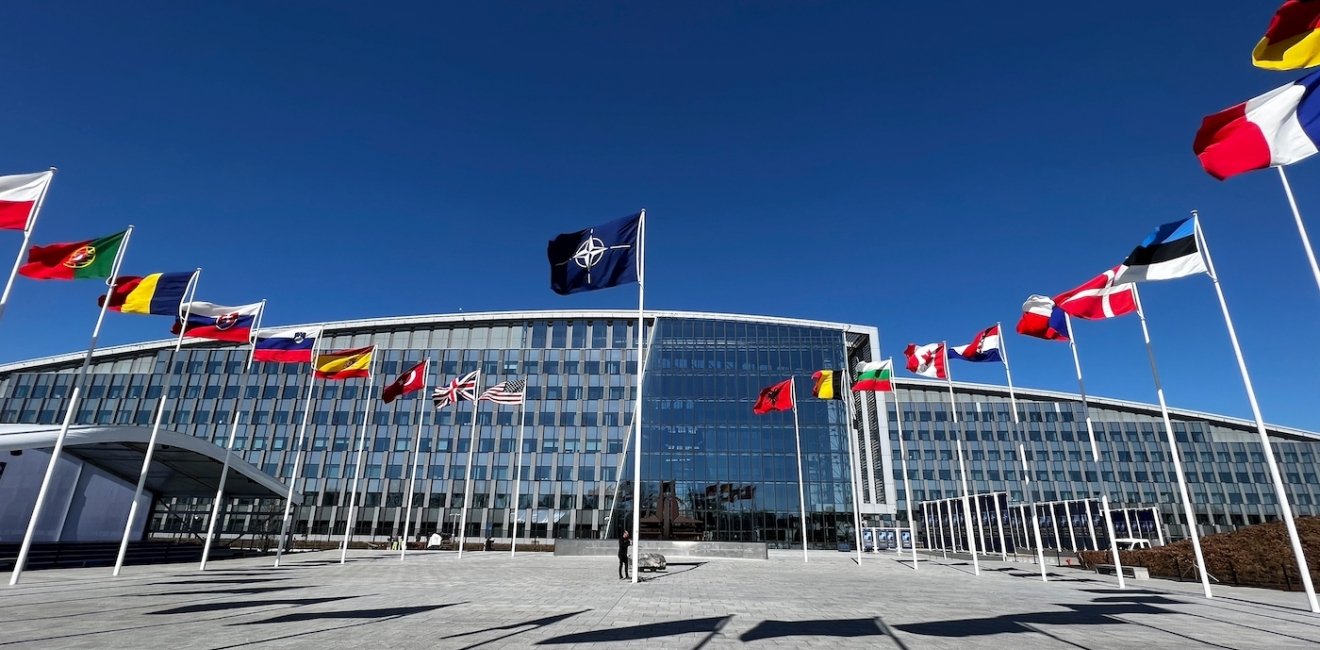
A blog of the Kennan Institute
This week, NATO allies are convening in Washington DC marking the alliance’s 75th anniversary. On the summit's agenda, Ukraine is expected to gain a "bridge to membership" through the implementation of a new NATO office in Kyiv. NATO is also expected to announce a joint commitment of $40 billion in financial assistance for Ukraine for 2025.
Despite progress on this front, the idea of Ukraine integrating into NATO still appears to be a topic of contention among policy analysts. Last week, Politico released an open letter signed by 60 foreign policy professionals meant to serve as a warning to the alliance that any further move towards Ukraine joining the bloc would be unwise for the sake of transatlantic security. However, these arguments are not particularly constructive given the nature of the real threat at hand, which is better described as rising Russian civilizational nationalism and imperialism in Europe. Analysts would be better served advising NATO to prioritize building a stronger strategy to help counter that threat rather than focusing on the wrong problem. Ukrainian integration into NATO is a logical future step given the circumstances—an idea to which even Henry Kissinger, who for years advocated keeping Ukraine out of the alliance, came around.
NATO as a Potential Bargaining Chip
One of the arguments that analysts against Ukrainian integration into NATO tend to have, is that keeping Ukraine out of the alliance could be used as a potential bargaining chip in a peace negotiation due to Russia's security concerns. But while the deterioration of Western-Russian relations after the Cold War may have been affected by questions pertaining to the European security architecture and Ukraine and Georgia’s place within it, the decision to wage war over this could have only been taken by an imperially motivated power.
Now that Russia has been waging a full-scale war against Ukraine for over two years, the initial grievances over matters of security are irrelevant. The war is now purely about territory and Ukrainian statehood, and Russia has made it clear through its actions and rhetoric that it does not consider the existence of an independent Ukraine as a viable option.
The war has accelerated the urgency for Ukraine to become fully nestled into western security and economic institutions. There is no turning back to lesser levels of integration with the West after such an overt violation of Ukraine's territorial integrity coupled with the wide-ranging response from NATO that ensued. The idea of Ukrainian neutrality died a long time ago: as much as 86% of the Ukrainian population now supports NATO membership.
Analysts overestimate the utility of the NATO question in their assumption that it can be part of the key to lasting peace. However, there cannot be a serious lasting peace deal in Ukraine because a peace deal assumes there is something to be negotiated—it would be naive to assume Russia would surrender its land conquests for an agreement over NATO enlargement to Ukraine. Those days are long gone. And negotiating over territorial issues would just legitimize Russian imperialism in Europe and symbolize the tacit acceptance of a balance of power structure on the continent, thus erasing the past 30 years of progress.
Russia has already declared that it is at war with the West both in Ukraine and in a larger sense. The Russian Orthodox Church even released a decree stating that Russia is in a “Holy War” against Ukraine and the West and aims to extinguish Ukrainian independence. Both the Russian Orthodox Church and senior Kremlin officials have described the invasion as part of an existential struggle against western “satanism.” Russia has no interest in behaving according to European norms as it has prioritized asserting itself as a great power through a civilizational conception of its identity that has claims over Ukraine and possibly other states. The church decree goes into detail about the necessity to reunite the “Russian World” as part of a spiritual mission to ensure the survival of the Russian state and its people across borders. Russia has closed the door on any kind of European future for itself by violating the basic norms of coexistence on the continent. It is best to simply continue isolating such an actor under current leadership, not reward its bad behavior. Russian Foreign Minister Sergei Lavrov agreed with the assessment by Russian foreign affairs specialist Dmitry Trenin that Russia was “done with Europe for at least a generation.” Russia has acknowledged that its cooperation with the West has been suspended for the long haul and the West should do the same.
NATO as an Effective Deterrent
Another argument this camp tends to have, is that it would be unwise for the US to overcommit itself and possibly end up in a direct confrontation with Russia should Ukraine ever join NATO, or otherwise risk the alliance's credibility in the event of nonresponse. First to note here is that NATO's article 5 defense clause does not automate boots on the ground; it states that allies should act as they deem necessary to ensure the proper defense of the ally under attack. That being said, the alliance will have to come to a consensus on how they would potentially implement article 5 should the need ever arise once Ukraine does join the alliance. This will strengthen the deterrent, a strategy that will most likely involve the implementation of rotating troop deployments to Ukraine as well as bolstering troop presence on NATO's eastern flank.
Currently NATO is actively supporting Ukraine's defense against Russia and should do so for the long haul. This creates resistance and renders the war harder for Russia to sustain. The goal should be to push back the Russian army as much as possible and end the war in a position of strength. Ukraine can then join NATO with the territory it manages to keep while refusing to recognize any remaining occupied territory as Russian. After experiencing defeat, it will take several years before the Russian military could realistically wage war again. But Russia has historically never invaded a NATO member and wants to avoid that possible confrontation as much as the West does. This strategy will ultimately create the best possible deterrent for future attacks as Russia will have had such difficulty the first time that it will shy away from attempting a repeat invasion, especially if Ukraine joins the alliance.
What Really Matters
Analysts should instead encourage NATO to prioritize protecting the western way of life and defending its security against a power that has no interest in restoring cooperative relations under its current leadership. This summit's goal should be to actively strengthen the alliance by investing more in its defense amidst the reality that Russia and the West are forging very separate paths. NATO should aim to strengthen deterrence in Ukraine which is achievable through sustained military support with the goal of achieving victory and integrating Ukraine into the alliance. This will delegitimize Russia's imperial ambitions, protect Ukraine and ensure its eventual integration into NATO in a safer and stronger Europe. If Henry Kissinger can change his mind over Ukraine in NATO, others can try to evolve their thinking as well and focus on the more pressing issues at hand.
The opinions expressed in this article are those solely of the author and do not reflect the views of the Kennan Institute
Author

Associate Professor of National Security Strategy, National War College, National Defense University; Former Professor of Strategic Security Studies, George C. Marshall European Center for Security Studies

Kennan Institute
The Kennan Institute is the premier US center for advanced research on Eurasia and the oldest and largest regional program at the Woodrow Wilson International Center for Scholars. The Kennan Institute is committed to improving American understanding of Russia, Ukraine, Central Asia, the South Caucasus, and the surrounding region through research and exchange. Read more

Explore More in The Russia File
Browse The Russia File
Chechnya as a Model of Modern Russia

Russia’s Indigenous Communities and the War in Ukraine

Gas and Power in a Changing US–Russia Relationship

